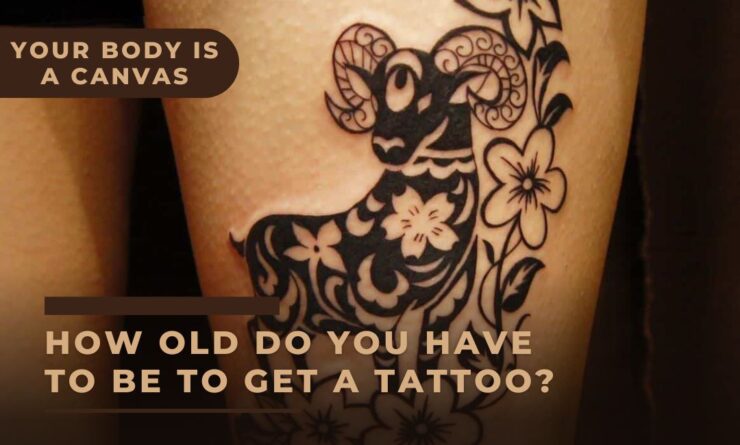Tattoos have been a sign of self-expression for centuries. People from different backgrounds have adorned their bodies with various designs. But, getting a tattoo is not something to be taken lightly – especially when it comes to age restrictions.
So, how old do you have to be to get one?
Generally, in most countries, the legal age requirement for a tattoo is 18 years old. This is when individuals are considered adults and can make decisions about their own bodies. This restriction ensures that people understand the potential risks and consequences associated with getting a tattoo.
However, there are some exceptions. In certain states or countries, minors may be able to get them with parental consent or in special cases. A common example, if a minor wishes to cover up scars from an accident or surgery, they may be allowed to get a tattoo before 18.
It’s important to note that age restrictions vary depending on where you live. Do your research and familiarize yourself with the laws and regulations in your specific area before making any decisions.
History
Now, let’s look at their history and their connection with different cultures. Earliest records have been found on mummies dating back thousands of years. They were popular in many ancient civilizations, such as Egypt, China, Polynesia, and North America. Each culture has used tattoos for different purposes.
For example, in Polynesia, tattoos were symbols of status and power. They were often used to mark life events such as coming-of-age ceremonies or battle achievements. Ancient Egyptians also believed that tattoos had magical properties and could provide protection or serve as charms against evil spirits.
Age Restrictions
Most countries require individuals to be at least 18 to get a tattoo without parental consent. However, some states in the U.S. allow them for minors as young as 16 with parental consent. Additionally, there may be cases where both consent and presence are needed.
Moreover, age requirements may depend on the type. Permanent makeup might have different regulations than regular tattoos. Artists are usually trained to assess individuals’ maturity and ability to make informed decisions, no matter their age. It is essential to research and communicate with local shops to ensure compliance with legal requirements.
Furthermore, certain restrictions may apply to certain body parts or designs. For instance, facial tattoos or explicit content might have stricter age limitations. Cultural and religious factors can also influence age restrictions – some societies may forbid permanent body modifications until a person reaches a certain age or milestone.
In Japan, where tattoos hold significant cultural connotations, many public places like pools and bathhouses prohibit individuals with visible ink from entry. This is a reminder of how societal perceptions can affect the acceptability based on affiliation.
Considerations Before Getting a Tattoo As a Minor
Getting one can be exciting, especially for minors wanting to express themselves. But there are important points to consider before inking as a minor.
- Design and Placement: Choose a meaningful and timeless design and placement. Tattoos are permanent and may be hard to remove or alter.
- Safety and Hygiene: When selecting a parlor, prioritize safety and hygiene. Do research and read reviews to make an informed choice.
- Mental and Emotional Readiness: Getting one is a big decision, so be mentally and emotionally ready. Think about your long-term commitment and how it may affect your life.
- Talk to people who have some, or industry professionals for insights.
Remember these factors when deciding to get a tattoo as a minor. Age restrictions, parental consent, design, placement, safety, and emotional readiness are all key. They are permanent, so think carefully to ensure satisfaction in the long run.
Alternatives for Minors
Young individuals who want a tattoo may wonder what options they have.Here are a few choices for minors. Such as:
- Temporary tattoos. These can be applied easily and last for a short time. Great for experimenting.
- Henna tattoos. Made with natural dye, they’re temporary and offer self-expression.
- Airbrush tattoos. Stencils and special equipment give a realistic look without commitment.
These alternatives do not replace the permanence of a real one. Minors must get permission from parents or guardians before exploring any options. Professional parlors will have policies for underage individuals, such as piercings or small designs in non-visible places.
FAQs
How old do you have to be to get a tattoo?
The age requiremen varies by country and state. However, in most places, you must be at least 18 years old to get one without parental consent.
Can I get a tattoo if I’m under 18?
In some places, individuals under 18 may be able to get a one with parental consent. However, this varies by location and shop policy.
Are there any restrictions on tattooing minors?
Yes, there are regulations in place. These include parental consent, restrictions on size and placement, and additional health and safety measures.
Can I get a tattoo if I’m 16 years old?
The age requirement for getting one without parental consent is generally 18 years old..
Do I need ID to get a tattoo even if I’m over 18?
Yes, most reputable shops require individuals to present a valid form of identification, such as a driver’s license or passport, even if they are over 18 years old.
Are there any medical conditions that may prevent me from getting a tattoo?
Yes, certain medical conditions, such as bleeding disorders, allergies, or skin conditions, may make it unsafe to get one. It is important to consult with a professional artist and disclose any relevant medical information before getting a tattoo.
Conclusion
The age for getting a tattoo differs by location. Laws are in place to protect minors and help them make wise decisions. In some cases, minors may be able to get them with parental permission.
It’s important to note that some countries have different age limits for different kinds of tattoos. For example, small, non-permanent ones might be allowed at a younger age than permanent ones. Research is key.
It’s a good idea for minors to talk to their parents or guardians about it. This communication will help them make the best decision and build trust.
Also, asking a professional artist for advice can ensure a safe experience. They know how to assess skin and keep the procedure clean. This minimizes any risks related to tattoos.




















